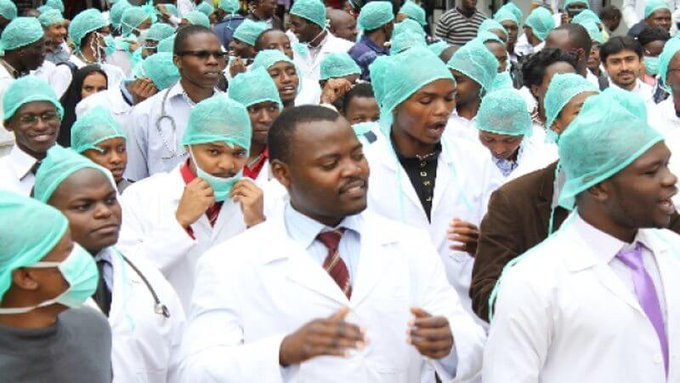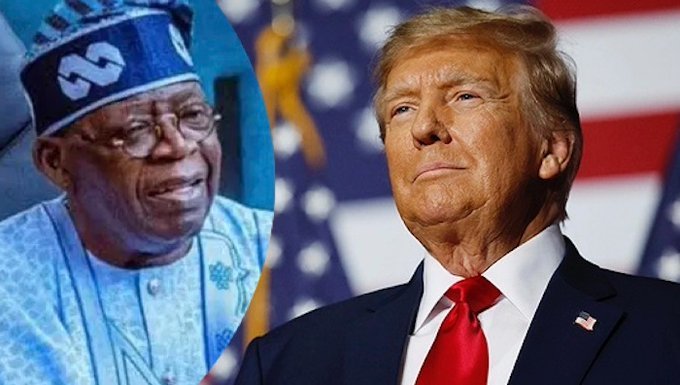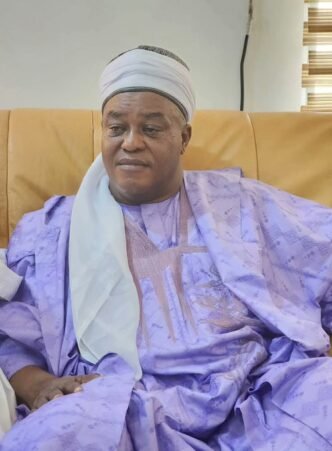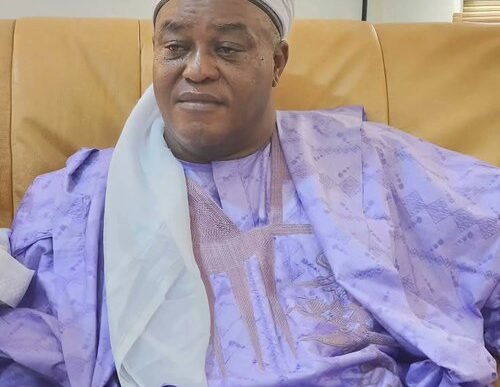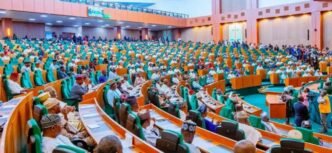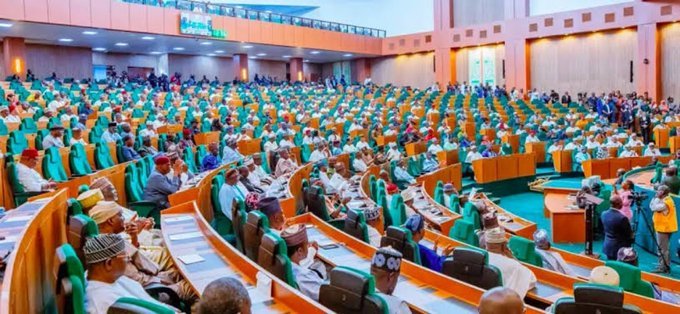Abuja — November 1, 2025
The Nigerian Association of Resident Doctors (NARD) has declared an indefinite nationwide strike, following the expiration of its 30-day ultimatum to the Federal Government. The action, which began at midnight on Saturday, threatens to paralyze medical services in federal and state-owned hospitals across the country.
In a statement issued early Saturday, NARD President, Dr. Mohammad Suleiman, said the association’s decision was a last resort after “repeated failures” by the government to fulfill long-standing agreements concerning doctors’ welfare, working conditions, and critical healthcare reforms.
“The strike has become inevitable following the continued failure of the Federal Government to honor its promises and implement the agreements reached with us after several rounds of dialogue, appeals, and ultimatums,” Dr. Suleiman said.
“Our demands are not new. They are essential to saving Nigeria’s collapsing healthcare system.”
Doctors’ Demands: 19-Point List Ignored
According to NARD, the strike followed the government’s inability to act on a 19-point demand list presented a month ago. Among the key demands are:
- Immediate payment of salary arrears and unpaid allowances — including hazard pay, skipping arrears, and the 25–35% upward salary review under the Consolidated Medical Salary Structure (CONMESS).
- Correction of entry-level placements for resident doctors and the payment of withheld promotion arrears.
- Implementation of the “One-for-One Replacement Policy” to ensure that doctors who leave the system are promptly replaced to reduce excessive workload.
- Provision of adequate medical infrastructure and consistent supply of essential drugs and equipment in tertiary hospitals.
- Reinstatement of resident doctors unjustly dismissed or demoted during previous industrial disputes.
- Settlement of arrears owed to medical officers and house officers in both federal and state institutions.
- Urgent action to halt brain drain, with better remuneration packages and improved working environments.
The association also demanded the payment of over ₦38 billion in accumulated arrears, which it said government agencies had failed to disburse despite multiple budgetary approvals.
“The Federal Government must understand that this strike is not about selfish interests,” NARD’s Secretary-General, Dr. Chinedu Eze, told journalists in Abuja.
“It is about fairness, survival, and the sustainability of the healthcare sector. The system is on life support, and we can no longer pretend otherwise.”
Hospitals Nationwide Shut Down
Reports from across Nigeria indicate that public hospitals have begun to feel the impact of the strike. Outpatient clinics in major tertiary hospitals — including the University College Hospital (UCH), Ibadan, Aminu Kano Teaching Hospital (AKTH), University of Nigeria Teaching Hospital (UNTH), Enugu, and the National Hospital, Abuja — have suspended non-emergency services.
At the Lagos University Teaching Hospital (LUTH), wards and laboratories were largely empty as resident doctors withdrew their services. Patients and relatives were seen stranded in hospital corridors, pleading for attention.
In Abuja, the strike affected operations at the National Hospital and the Federal Medical Centre (FMC) Jabi, where only consultants and nurses were on duty to handle emergencies.
A medical officer at FMC Abuja, who requested anonymity, said:
“We’ve been stretched thin for months. Many of us have worked double shifts to keep the wards functional. But without meeting the doctors’ demands, morale is at its lowest.”
Government Yet to Respond Officially
As of Saturday afternoon, the Federal Ministry of Health had yet to issue an official response to the industrial action. However, government sources hinted that a high-level meeting was being convened to assess the situation and chart a possible response.
A senior official in the Ministry, who asked not to be named, said:
“Government has engaged NARD several times and made significant progress. We hope they will reconsider this indefinite strike because it will hurt ordinary Nigerians more than anyone else.”
The source added that some of the demands, including salary adjustments and arrears, were already being processed through the Ministry of Finance and the Office of the Head of Civil Service.
Despite these assurances, NARD insists that previous promises have gone unfulfilled, noting that the association has suspended multiple strikes in the past on the strength of government assurances that were never implemented.
Widespread Concerns Over Patient Care
The strike poses a major challenge to Nigeria’s already fragile healthcare system, with resident doctors forming the backbone of hospital operations in most tertiary institutions. They are responsible for the bulk of consultations, surgical procedures, and emergency responses.
Health analysts warn that the absence of these doctors could have devastating consequences, especially for patients requiring urgent medical attention. Maternal care, accident response, and specialist treatments are expected to be severely disrupted.
Dr. Grace Amadi, a public health consultant, described the situation as “a ticking time bomb.”
“We are talking about a country with one of the lowest doctor-to-patient ratios in the world — about one doctor to 5,000 patients. Every strike worsens that gap and endangers lives,” she said.
Lawmakers and Unions React
Nigeria’s National Assembly has called for urgent intervention to avert a full-blown healthcare collapse. The House Committee on Health Services on Friday urged both parties to return to the negotiating table immediately.
Chairman of the committee, Hon. Ibrahim Bichi, said lawmakers were in touch with both NARD and the Ministries of Health and Labour to broker a compromise.
“We understand the doctors’ frustrations, but the nation cannot afford a prolonged shutdown of healthcare facilities. We are appealing to both sides to resume dialogue in the national interest,” Bichi said.
Meanwhile, the Joint Health Sector Unions (JOHESU) and the Nigerian Medical Association (NMA) expressed solidarity with the resident doctors, warning the government against what they termed “habitual neglect” of the health sector.
A Crisis Years in the Making
Industrial disputes in Nigeria’s health sector have become almost cyclical. The current strike follows a series of similar confrontations between NARD and successive governments over unmet agreements dating back more than a decade.
Between 2020 and 2023 alone, resident doctors embarked on five nationwide strikes, often triggered by issues of poor pay, unsafe working environments, and delayed promotions.
Experts argue that the recurring pattern underscores deep structural weaknesses in Nigeria’s public health administration. Despite annual increases in health budgets, less than 7% of the national budget typically goes to healthcare — far below the 15% target recommended under the 2001 Abuja Declaration.
Impact on Brain Drain and National Health
Nigeria is currently experiencing one of the worst medical brain-drain crises in its history. Data from the Nigerian Medical Association indicates that over 16,000 doctors have left the country in the past five years in search of better working conditions abroad.
The ongoing strike could accelerate the exodus. According to NARD, more than 2,000 resident doctors have resigned in the last 18 months, citing poor remuneration, insecurity, and burnout.
Dr. Suleiman warned that unless decisive action is taken, “Nigeria will soon have more Nigerian doctors in London than in Lagos.”
What Happens Next
Negotiations between the government and the striking doctors are expected to resume in the coming days. However, there is little optimism for a quick resolution unless concrete action is taken to address the doctors’ grievances.
If the strike continues, Nigerians may face longer hospital waiting times, reduced emergency care, and increased reliance on private hospitals — many of which remain unaffordable for the average citizen.
Observers say the situation presents President Bola Tinubu’s administration with a critical test of leadership in the healthcare sector. Resolving it swiftly, they argue, will not only restore services but also rebuild confidence in the government’s commitment to workers’ welfare.
Conclusion
As the indefinite strike by the Nigerian Association of Resident Doctors enters its first day, the nation braces for widespread disruption across public hospitals. With lives hanging in the balance, the Federal Government faces mounting pressure to act decisively and honor its obligations.
For now, the doctors’ message remains clear: until their demands are met, the stethoscopes will remain silent.


